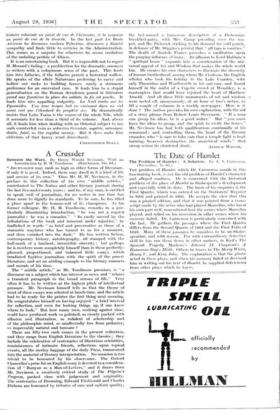A Crusader
Between the Wars. By Henry Woodd Nevinson. With an Introduction by H. M. Tomlinson. (Hutchinson. 10s. 6d.) " JOURNALISM may rank as high as other forms of literature, if only it is good. Indeed, there may dwell in it a kind of life and .service of its own." Thus Mr. H. W. Nevinson, in the preface to this collection of his own middle articles," contributed to The Nation and other literary journals during the last five-and-twenty years ; and he, if any man, is entitled to speak well of journalism, for no writer in our time has done more to dignify its standards. To be sure, he has filled a place apart in the honour-roll of its champions. As his former colleague, Mr. H. M. Tomlinson, remarks in a par- ticularly illuminating introduction, he was not a regular journalist ; he was a crusader." " So easily moved by the tribulations of the weak and innocent under injustice," he trafficked in words " as brief' and provocative as those of a romantic wayfarer who has turned to us for a moment, and then vanished into the dark." He has written fiction, contemporary history, autobiography, all stamped with the hall-mark of a lambent, irresistible sincerity ; but perhaps he is nowhere more completely himself than in these perfectly- phrased, proportioned, and balanced little essays, which irradiated fugitive journalism with the spirit of the purest literature, and set an abiding example to the literary manners and morals of his time.
The " middle article," as Mr. Tomlinson premises, is " a discourse on a subject which has interest as news, and " relates a transient paragraph to the broad stream of life." Very often it has to be written at the highest pitch of intellectual pressure. Mr, Nevinson himself tells us that the theme of most of these essays was selected at lunch-time, and the article had to be ready for the printer the first thing next morning. He congratulates himself on having enjoyed " a brief interval for reflection, and even for looking things up, if one knew where to look." But how many men, working against time, could have produced work so polished, so closely packed with allusion and illustration, so redolent of scholarship and of the philosophic mind, so unaffectedly free from pedantry, sa impeccably natural and humane ?
There are, fifty-two such essays in the present collection, and they range from English literature to the classics ; they include the celebration of centenaries of illustrious celebrities, reminiscences of intimate friends, reflections upon topical events, all the motley. baggage of the daily Press, transmuted into the material of literary interpretation. No occasion is too trivial to be honoured by his observance. The Oxford Chancellor's prize for an English essay is devoted to a considera- tion of " Bunyan as a Man-of-Letters," and it draws from Mr. Nevinson a creatively critical study of The Pilgrim's Progress, packed close with judgement and originality. The, centenaries, of Browning, Edward FitzGerald and Charles Dickens are honoured by tributes of rare and radiant quality, the last-named a humorous description of a Dickensian breakfast-party, with Mrs. Camp presiding over the tea- pot, and Mr. Pickwick sticking to his demand for cold punch, in defiance of Mr. Stiggins's protest that " all taps is vanities." The death of Anatole France provokes a meditation upon the purging influence of irony. An allusion to Lord Haldane's " spiritual home " expands into a consideration of the uni- versal appeal of Art and Wisdom that makes the whole world kin. He creates his own characters to illustrate the diversity of human brotherhood, among whom Mr. Clarkson, the English scholar who took his holiday in the Lake Country, with only Theocritus and Wordsworth in his suit-case, and found himself in the midst of a Cup-tie crowd at Wembley, is a masterpiece that would have rejoiced the heart of Matthew Arnold. And all these little monuments of wit and wisdom • were reeled off, anonymously, at an hour or two's notice, to fill a couple of columns in a weekly newspaper. How is it done ? The author provides his own explanation, with the aid of a stray phrase from Robert Louis Stevenson. " If a man can group his ideas, he is a good writer." But " you must have the ideas to group, and the spirit to vivify the bones." Mr. Nevinson has had both qualifications continually at his command ; and, controlling them, the heart of the literary crusader, who " is sure to take care that a temple light is kept burning, however destructive the anarchical winds " that sweep across its cloistered shade. ARTHUR WAUGH.






































 Previous page
Previous page